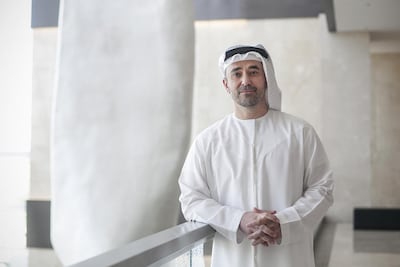A top UAE official said the country has managed to strike the balance between lives and livelihoods, when it comes to managing the economy during the pandemic.
Omar Saif Ghobash, Assistant Minister for Culture and Public Diplomacy, said the economy could not be put on hold, as efforts to tackle the coronavirus and introduce the vaccine continue.
"Obviously there are people who are still getting sick, and unfortunately passing away," Mr Ghobash, a former ambassador to France and Russia, told CNBC Middle East.
"But overall we think that we've managed to find the balance between health and safety on the one hand, and economic viability on the other hand."
Mr Ghobash said it was up to everyone in society to work together to get through the pandemic.
“It’s really about balancing personal responsibility, with an economy that needs to go forward," he said.
The UAE has opened up most of its economic sectors and is one of the few countries to allow tourists to return in significant numbers.
The decision has contributed to an ongoing economic recovery, though the number of new cases has risen significantly following the Christmas and New Year holidays.
On Monday, officials reported 3,471 more cases – a record number for seventh consecutive day – taking the total since the pandemic began to 256,732. A further six people died, taking the three-day death toll to 18.
That compares to about 1,000 cases per day in late December.
This spurge in cases coincided with a major vaccination drive to inoculate 50 per cent of the population by March. On Monday, 88,743 people received a vaccine shot and more than 1.8 million doses have been administered so far.
UAE 'must have say' in any future Iran deal
Mr Ghobash was also asked about relations between Washington, the Gulf states and Tehran. He said the Emirates would be open to restoring relations with Iran, but that this would depend on a significant change in behaviour from the Iranian government.
“We don't have a problem with rapprochement with Iran,” he said.
"It needs to be conditional. It needs to be participatory. We need to be able to engage also with the Biden administration, with the Iranians, with the region, because we're all implicated in these questions.”

In recent months, there has been discussion about the prospect of a new "Iran deal", the agreement that relaxed almost all trade sanctions in exchange for UN nuclear inspectors being allowed to visit atomic research sites.
Washington withdrew from the agreement in 2018, largely objecting to “sunset clauses” that would have allowed Iran to continue nuclear research at a later date. Washington re-imposed sanctions on Iran, a signature policy of President Donald Trump’s administration known as “maximum pressure”.
Mr Ghobash said that the deal, “didn't take our concerns into account and it treated us as bystanders, and as spectators, when we felt that it was directly concerned with our security”.
Any new agreement would have to emphasise a renewed commitment to nuclear non-proliferation on the part of Tehran, Minister Ghobash said, before opening up other doors, such as renewed trade. In the absence of any new deal, Mr Ghobash said the UAE would be in favour of continued pressure on Iran to use as leverage in potential talks.
“We do business with Iran, we've got a significant Iranian population here, we don't have an issue with that. We do have an issue with ballistic missiles, nuclear technology, looking at a nuclear weapon, and the corrosive influence that they have on many Arab economies.
“So, if we can put an end to all of that, fantastic, everybody would be very happy to deal with Iran on an equal basis.”
“We are still in favour of maximum pressure – yes, absolutely. Was it successful? We think it will succeed,” he said.
He pointed to the fact that Barbara Leaf, the former US ambassador to the UAE, was chosen for Mr Biden’s national security team.
“She knows our concerns very well, and we would expect that those concerns be taken into account,” he said.
The minister said he believed future talks with Iran would be more balanced.
“We in the Emirates are a positive influence, the Gulf states are a positive influence ... take us on board and see the positive influence that we can bring to discussions on Iran,” he said.
___________________






































